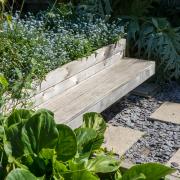Whether you have a conservatory or just some well-lit rooms with natural light, the addition of houseplants is both decorative and beneficial to our health. The Royal Horticultural Society reports that studies have shown indoor plants reduce blood pressure, fatigue, stress and headaches, as well as improving mood (a topic we looked at in our September-issue feature on The Glasshouse, Cranbrook - itself a treasure trove of great houseplants theglasshouse.co.uk).
READ MORE: Behind the scenes at The Glasshouse in Cranbrook
A wander around your local garden centre or plant shop will open up the possibilities for your home. Bring in some autumn cosiness with displays of potted plants, some that will flower through winter and others valued for their foliage. Plants that will give colour and interest through winter also make lovely Christmas presents – from iridescent cyclamen to handy herbs to pop on the kitchen windowsill. Indoor plants connect us to nature and give us something to nurture, especially as we’ll be spending less time outside in the garden through winter.

There has been a real trend since the term 'Biophilic design' was first coined in the 1980s to create schemes that from the outset incorporate plants in architectural plans of both domestic and public spaces. We can embrace this concept on a smaller scale in our own well-lit rooms. I chatted to Laura Newton, who opened Thrive, the little botanical shop in Tankerton, in February this year, where she sells a range of prettily potted indoor plants as well as locally made macramé hangers. Here you will find choices such as variegated aloes, crimson-leaved begonias, prickly mini cacti, attractively marked prayer plants with their green, cream and pink leaves, as well as stately parlour palms. Planted in Elho planter pots in a range of colours so you can co-ordinate the look to match your interior, they’d also make lovely gifts. ‘I have two personal favourites: easy-care aspidistra, a common feature in many Victorian hallways, with its gorgeous tall, dark green, paddle-shaped leaves that make a real statement, and the Christmas cactus, a popular winter flowering and super-easy houseplant,’ says Laura.

At the family-run Brookside Garden Centre in East Peckham you can find some rare houseplants, including the stunning Strelitzia, bird of paradise, with their colourful and unusual blooms. ‘We stock all your ‘bread and butter’ houseplants, so there are spider plants, ferns, orchids, snake plants and monstera, as well as more rare and unusual plants that you won’t find in many garden centres. We also have a selection of bonsai and larger specimens. We buy-in a different selection each week, as we like to have new and interesting plants,’ explains Matt Shead. When caring for orchids Matt advises cutting off the stem as soon as its flowers drop. ‘By doing that, the plant will be directing all of its energy in creating new stems instead of wasting energy on the spent stem. Once cut back, place in a bright spot like a window ledge - they seem to love that. Just be mindful of how bright the window is; south-facing might be too intense. Use the correct fertiliser, such as Orchid Grow, for the period without flowers and Bloom for when it’s flowering,’ he adds.

For some further top tips take a look at the interview on the National Garden Scheme’s website with Mercy Morris, who shares her home in Herne Bay with over 150 house plants, including her favourite spider plants, for which she holds the National Collection. She was the first National Garden Scheme garden to open solely to show indoor plants (she's hoping to show them again in 2024) and has a clear passion for the benefits of indoor horticulture. Her advice includes taking cuttings of plectranthus and placing them in glasses to observe their roots growing and to use philodendron for low-light areas. Spider plants, she says, are great if you're after something to cascade over shelves, you can’t overwater air plants, and snake plants are ideal for beginners. Mercy recommends growing a variety of different plants to develop your skills and find new aspects of the hobby to become obsessed with, whether you are a collector of one specific plant or prefer little bits of everything.
To know
Thrive, thrivewhitstable.co.uk
Brookside Garden Centre, brooksidegc-kent.co.uk
Mercy Morris, mercyjanemorris@gmail.com - details of her next plant show will be posted on plantheritage.org.uk
Two others to try:
Petals & Past, Westerham for lovely houseplants and dried flowers petalsandpast.co.uk
There also is a constantly changing display of houseplants on offer Highgrove Garden Centre in Marden, from asparagus ferns and weeping figs to forced hyacinths and dainty violetshighgrovegardencentre.co.uk

Top tips for happy houseplants
• The best winter indoor plants – cyclamen, orchids, dwarf citrus, sansevieria, ZZ plant, succulents, jade plant, aspidistra, dracaena, anthurium, ficus, philodendron, Christmas cactus, aloe vera, oxalis, pothos, tradescantia, gardenia, azalea, jasmine, hippeastrum
• Position them where they can get the best light, especially morning light
• Remove any spent flowers carefully
• Choose houseplants that suit conditions in your home - most need a temperature of between 12 – 18 degrees, and don't like large fluctuations in heat
• Water by standing in a bowl containing a few centimetres of water for five minutes, then drain
• Check for pests regularly
• For plants that need increased humidity, place them on a pebble tray and group them together
• Bromeliads, orchids and succulents are ideal for bedrooms, to refresh the air while you sleep
• Happy plant parenting!

Creating your own festive plantscape
If you are new to growing, begin with the easiest plants and choose from lush, leafy options, spiky sculptural shapes, or plants that flower. You can be imaginative with where you position the plants: you could hang them from the ceiling, pop them on shelves and table tops or group them in corners. For a seasonal flurry match them to your Christmas ornamentation with schemes of rich tones - for instance you could pick up gold tones in variegated foliage or mass cyclamens with their luminous crimsons. For the best success use low-maintenance varieties that will happily work with your decorating. These could include eye-catching sansevieria (snake plant), variegated philodendron, fleshy haworthia or jungly yuccas.

Arrange groups to form vignettes to draw the eye, while ensuring the plants have enough light. Plants could trail and drape along a mantelpiece accompanied by baubles and pinecones, or entwine them around the base of large candles. Dress up the containers with pretty bows to match your colour scheme, or hang some strung ornaments around them.
When it comes to giving indoor plants as gifts think creatively, too. You could give a group that would work well together, add some seasonal sparkle with a garland you’ve made or even add a string of fairy lights. A selection of scented herbs in pretty pots to use for festive meals should be well appreciated. For a rustic feel, you could create a living panel of succulents and cut logs, for a tropical feel select some colourful orchids or Strelitzia, birds of paradise - and a lovely potted citrus should give off a suitably Christmassy scent.



























